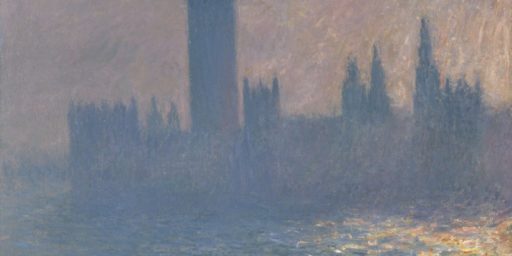Is Iraq a Democracy?
Neil the Ethical Werewolf, guesting at Ezra Klein’s place, argues that Iraq really isn’t a democracy:
Clearly, people in Iraq occasionally cast votes, and the ballots determine things like who sits in the Prime Minister’s office in Baghdad. But it seems to me that democracy requires something more than this. If the security forces that run the country have greater allegiances to unelected leaders like Muqtada al-Sadr than to their elected leaders, it’s not a democracy. We could argue about whether political power everywhere grows from the barrel of a gun, but it certainly does in Iraq. And if the way the barrels of the country’s guns are pointed is determined more by Muqtada’s wishes than those of Nouri al-Maliki, the Iraqi Parliament, and other legitimately elected representatives of the Iraqi public, we haven’t brought democracy to the country.
To a large extent, this is a pedantic debate, along the lines of whether Iraq currently in a technical state of civil war, where we can agree with the facts and still disagree on the definition. Still, academic discussions are often useful, in that they help us clarify the larger issues about our goals and the meaning of the words we use.
Under most textbook definitions, Iraq is nominally a “democracy,” specifically a representative one. There are meaningful, free, open elections that chose the people who sit in government and make the rules.
Most of us think that “democracy” means more than that, though. Indeed, our own State Department has a pretty good list of what they term THE PILLARS OF DEMOCRACY:
* Sovereignty of the people.
* Government based upon consent of the governed.
* Majority rule.
* Minority rights.
* Guarantee of basic human rights.
* Free and fair elections.
* Equality before the law.
* Due process of law.
* Constitutional limits on government.
* Social, economic, and political pluralism.
* Values of tolerance, pragmatism, cooperation, and compromise.
There’s a pretty thorough discussion of these issues at the link but I think most of us have a broad idea of what these things mean, even if we niggle about the details.
Stanford’s Larry Diamond telescopes those pillars into four points:
1. A political system for choosing and replacing the government through free and fair elections.
2. The active participation of the people, as citizens, in politics and civic life.
3. Protection of the human rights of all citizens.
4. A rule of law, in which the laws and procedures apply equally to all citizens.
Institutionally, Iraq is a democracy under even these ambitious definitions. All those things are constitutionally guaranteed and there are actual mechanisms in place for assuring all those things. In application, though, basic human rights, cooperation, and tolerance are not realities of everyday life.
The real problem is not so much that Iraq is not “a democracy” but that it borders on being a failed state. It is failing to guarantee basic rights to its citizens not because of tyranny–as was the case under Saddam Hussein–but because it is unable to establish the rule of law across the land. That’s a more fundamental problem, frankly.
Establishing democracy under the State Department definition is difficult under the best circumstances. It arguably didn’t happen in the United States until the late 1960s and, according to some advocates for gay rights, hasn’t happened yet. Still, aside from the unpleasantness of 1860-65, there was at least functioning government that provided for basic security needs from the beginning.





I’m skeptical about just how free and fair the Iraqi elections were. How free can they be when the political parties are armed gangs who have the ability to prevent other parties from participating in the process. The end result isn’t democracy but the affirmation of thugocracy via a democratic process.